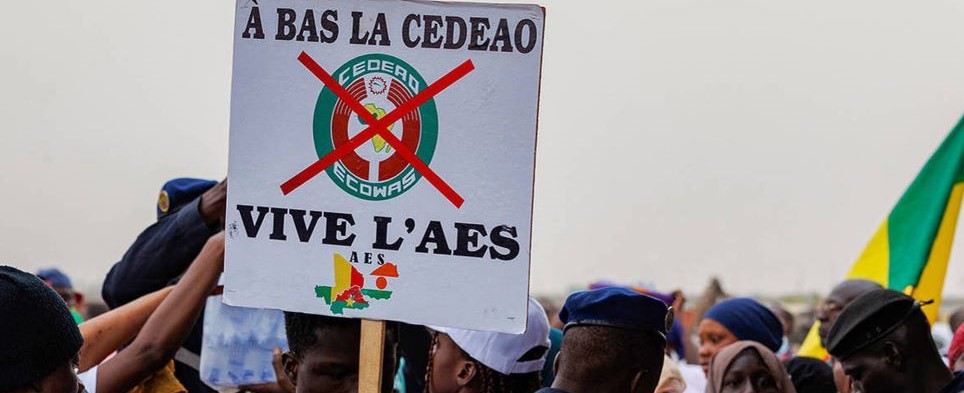(3 Minutes Read)
Today, the Economic Community of West African States (ECOWAS), the West African regional grouping of 15 members, faces an existential crisis. The primary objective of ECOWAS when it was formed in 1975 was to promote economic integration in the region. Over the years, the mandate was extended to more areas to protect the socio-economic well-being of the West African people. It adopted protocols to foster political stability, democracy, and good governance. Sanctions were imposed against regimes that tried to tamper with the country’s constitution to grab or continue in power. Though the objective was to restore the rule of law and democracy, these sanctions soon became counter-productive.
The fundamental challenge for ECOWAS is balancing the need to protect democracy and good governance without impacting the socio-economic situation of the affected countries. Sanctions as a tool, were used to put pressure on governments to uphold democratic norms. But they also propagated challenges including diplomatic dilemmas, humanitarian crises, and economic repercussions.
The latest instances of ECOWAS sanctions against Mali, Guinea, Burkina Faso, and Niger explains the dilemma. Mali, Niger, and Burkina Faso are among the least developed countries with high levels of poverty and unemployment. The coups that took place in these countries were partly attributed to the brimming public frustration with the government’s inability to improve security issues and living standards. All three countries grappled with issues related to democratic governance, allegations of electoral fraud, and political repression prompting scrutiny and sanctions.
The imposition of sanctions against these countries failed to make an impact on the junta that overthrew elected leaders. However, it led to unintended humanitarian and economic hardships for the vulnerable populations. In Mali, the suspension of aid and financial assistance further devastated the already fragile economy. Similarly, in Niger and Burkina Faso, sanctions further worsened food insecurity and displacement.
The ECOWAS dilemma is that it must carefully navigate the political and economic crises. Continuing its dialogue and mediation efforts, maintaining pressures on the revolting juntas while shielding the citizens from economic and humanitarian fallout, is a formidable task. It also must keep on its radar, the specific economic, political, and social dynamics of each country.
At the regional level, the economic consequences of the Sanctions have had wider ramifications. The disruption to trade and investment has impacted West Africa’s regional security and stability, defeating the very goal of economic integration.
In retaliation to the sanctions, in January 2024, Burkina Faso, Mali, and Niger announced their decision to quit ECOWAS. Although ECOWAS offered to lift the sanctions, the three countries are determined to craft their new Alliance of Sahelian States (AES). The foreign ministers from Burkina Faso, Mali, and Niger met in Niamey, Niger, on May 17, 2024, to finalise a draft agreement establishing the AES.
The perceptions vary about the outcome of the exit of the three West African countries from the ECOWAS fold. Some are of the view that the exit will worsen the plight of the three economies. These landlocked economies depend heavily on intraregional trade. The reintroduction of tariff barriers is likely to further strain the Sahelian countries.
Political analysts also predict that this could lead to a strategic shift in international cooperation. These former French colonies are striving to navigate away from France. The strategy is to reduce their dependence on France for security support by moving closer to Russia and China. Such a development is bound to escalate the power struggle between Russia, China, and the Western nations.
Some Experts hold a different view. They believe that the formation of the AES has the potential to reshape the security landscape in the Sahel region. Close collaboration between member states on intelligence sharing, joint military operations, and border security could deal more effectively, with the threats posed by insurgency groups in the region.
Political analysts are closely watching the development. Eventually, the success of AES depends on evolving a governance model in alignment with the needs of the Sahel Region rather than the existing Western-backed model. Nevertheless, it also depends on the member states’ commitment to good governance, transparency, and addressing the root causes of instability.
In retaliation to the sanctions, in January 2024, Burkina Faso, Mali, and Niger announced their decision to quit ECOWAS and craft their new Alliance of Sahelian States (AES).The foreign ministers from Burkina Faso, Mali, and Niger met in Niamey, Niger, on May 17, 2024, to finalise a draft agreement establishing the AES. Political analysts predict this could lead to a strategic shift in international cooperation. The strategy is to reduce their dependence on France for security support by moving closer to Russia and China. Such a development is bound to escalate the power struggle between Russia, China, and the Western world.





